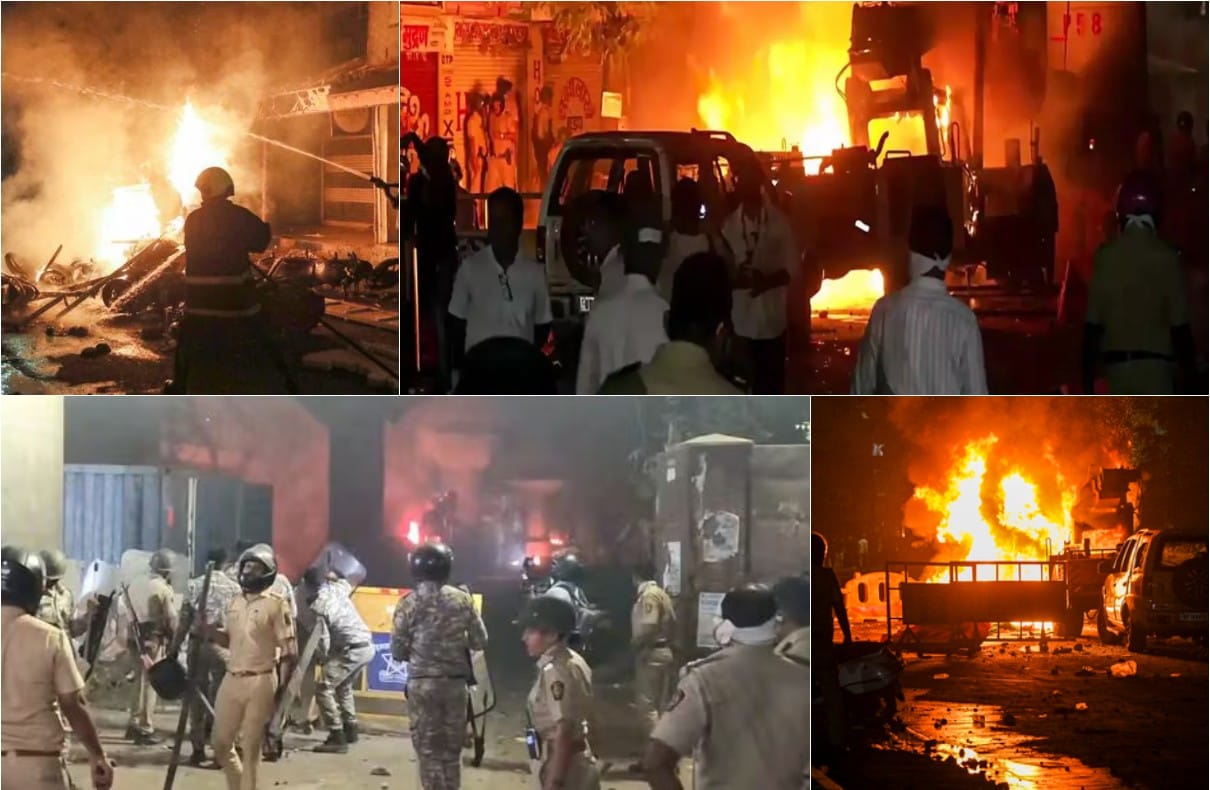Historically, Nagpur has been a center for India’s social and cultural movements. However, today, it has become the latest victim of the divisive politics of the BJP and RSS. The recent violence, in which several police officers and civilians were injured, is enough evidence that yet another chapter of communalism is being added to the laboratory of power. The question is—does the BJP and the Sangh Parivar once again intend to push the country into the flames of riots, or is this merely an electoral strategy to divert public attention from real issues?
Chief Minister Devendra Fadnavis called the violence in Nagpur a “planned attack,” but he remained silent on the question of who actually orchestrated this plan. Looking at the statements of BJP leaders and organizations affiliated with the Sangh, it is clear that a well-thought-out conspiracy is being hatched to incite religious fanaticism.
The reactions seen in response to the film Chhava were not spontaneous outrage but rather a part of the Hindutva agenda. The Sangh Parivar has always sought to divide Indian society along religious lines under the guise of cultural nationalism. This violence was a result of that strategy, where history was distorted, and an attempt was made to incite people based on communal lines.
The politics of the Sangh has always revolved around three main objectives:
- Weakening the secularism of the Indian Constitution.
- Attacking individual freedoms.
- Creating an atmosphere of fear.
The Sangh has never accepted India’s secular Constitution. From Golwalkar to Mohan Bhagwat, the top leaders of the RSS have repeatedly stated that India should be established as a Hindu Rashtra. This ideology directly contradicts the Indian Constitution, which upholds equality, freedom, and fraternity.
In a democratic society, individuals have the right to live according to their religious and social beliefs. However, the entire structure of the Sangh is built against this ideology. From women’s rights to the lives of minorities, this organization is consistently working to curb individual freedoms.
The third major objective of the Sangh and BJP’s politics is fear-mongering. They skillfully adopt strategies to create fear between communities. Whether through the narrative of “love jihad,” mob lynching, or controversies over films and books, their only aim is to marginalize minorities and instill a false sense of insecurity among the majority community to strengthen their Hindutva politics.
History provides several examples of the BJP and Sangh’s divisive politics—be it the 1992 Babri Masjid demolition, the 2002 Gujarat riots, the 2013 Muzaffarnagar riots, or the 2020 Delhi violence during the anti-CAA protests. In each case, communal tensions were systematically escalated for political gains.
The real intention behind the Nagpur violence is BJP’s upcoming electoral strategy of polarization. As the nation grapples with an economic crisis and rising unemployment, the BJP has nothing substantial to offer the people. In such a scenario, divisive politics becomes its last resort.
Chief Minister Devendra Fadnavis labeled the Nagpur violence as a “pre-planned attack,” yet he chose to remain silent on who actually planned it. Examining the statements of BJP leaders and Sangh-affiliated organizations, it is evident that a deliberate conspiracy is underway to fuel religious extremism.
At the same time, preparations are being made to weaken the Constitution. The repeated discussions about amending the Constitution are a clear indication of this. The Fadnavis government and the Sangh’s ideological agenda aim to gradually steer India toward becoming a Hindu Rashtra.
Additionally, in their tried-and-tested strategy to divert public attention, the BJP has resorted to communal frenzy, ensuring that debates do not center around issues like the Adani controversy, unemployment, inflation, farmer protests, and education policies.
The Indian Constitution guarantees equal rights to all its citizens, but BJP and Sangh politics paint a completely different picture. Issues such as “love jihad,” cow slaughter, and religious conversions are used as legal tools against minorities. Through “bulldozer politics,” homes of Muslims and Dalits are being demolished. Attacks on madrassas, hijabs, and halal practices are deliberate attempts to erase the cultural identity of Muslims. Meanwhile, hate speech on social media and the glorification of Nathuram Godse are being promoted.
The BJP and Sangh are well aware that if people start questioning real issues, their power will be in jeopardy. That is why they repeatedly attempt to push the country towards communal violence—by distorting history, fueling Hindu-Muslim disputes, spreading rumors on social media, and aligning law enforcement agencies with their communal agenda.
Today, as the BJP-Sangh agenda openly stands against the Constitution, secularism, and fraternity, there is a pressing need to intensify the ideological battle against it. Challenging the Sangh’s hold on education and media is crucial. At the same time, exposing the falsehoods spread in the name of history and culture, uniting to protect the rights of minorities and marginalized communities, and organizing large-scale social movements in support of democratic and secular values are the need of the hour.
The Nagpur violence and the politics surrounding it clearly indicate that the BJP and Sangh’s primary objective is to keep the public divided for their political survival. But the real question is—will the peace-loving citizens of this nation allow this to happen?

